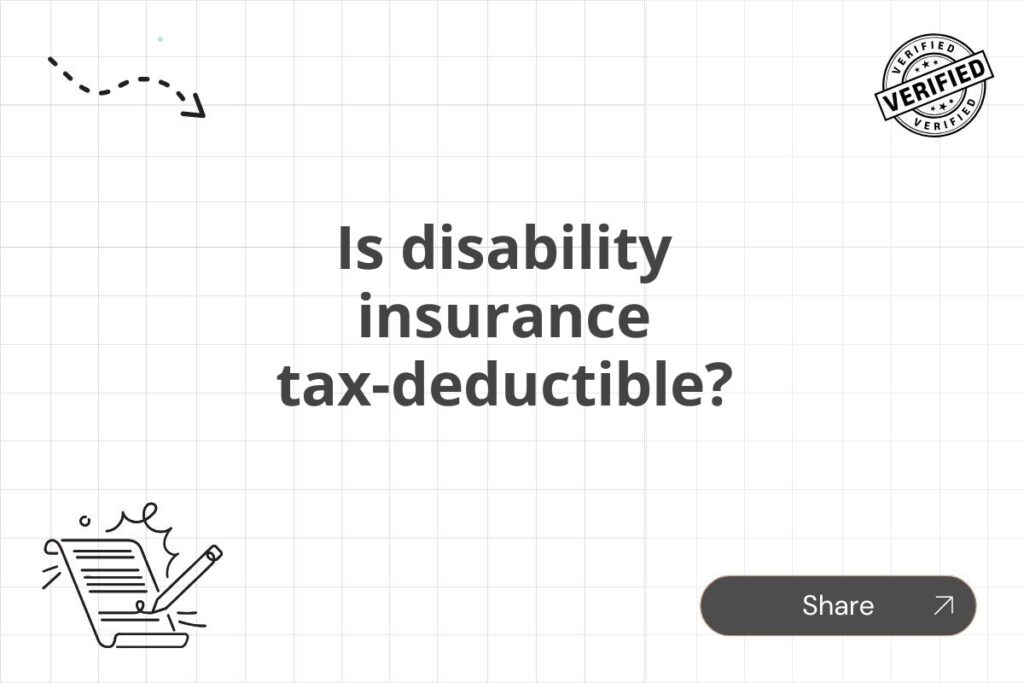Meta Description: Is disability insurance tax-deductible? Learn the intricacies of deducting disability insurance premiums. We explore self-employed vs. employee scenarios, limitations, and IRS regulations to help you understand your tax benefits.
The question, “Is disability insurance tax-deductible?” is a common one, and the answer, unfortunately, isn’t a simple yes or no. The deductibility of disability insurance premiums depends heavily on several factors, including your employment status (self-employed or employee), the type of policy you have, and specific IRS regulations. This comprehensive guide will delve into these nuances, providing you with a clear understanding of the tax implications of disability insurance.
Understanding the complexities surrounding the tax deductibility of disability insurance is crucial for both individuals and businesses. Properly navigating these regulations can lead to significant tax savings, while a misunderstanding could result in penalties. This article aims to illuminate the path toward maximizing your tax benefits while remaining compliant with the law.
Disability Insurance for Employees
For employees who receive disability insurance coverage as a benefit from their employer, the premiums are typically paid by the employer and are
not
tax-deductible for the employee. The premiums are considered a form of compensation and are already factored into the employee’s taxable income. The benefits received from the disability insurance, however, may be tax-free depending on whether they were paid for through pre-tax dollars.
However, there’s a critical distinction to be made: if an employee
pays
for supplemental disability insurance coverage above and beyond what their employer provides, the situation becomes more complex. In many cases, these supplemental premiums are
not
tax-deductible. The IRS generally does not allow deductions for personal insurance premiums, including supplemental disability insurance, unless they are specifically outlined as deductible under the law. Consult with a tax professional or refer to IRS Publication 503 for specific guidance in this situation.
Disability Insurance for the Self-Employed
The tax implications of disability insurance are significantly different for self-employed individuals. For self-employed professionals, business owners, and freelancers, disability insurance premiums can often be deducted as a business expense. This is a critical advantage, as it can substantially reduce the overall tax burden.
Deduction Requirements for the Self-Employed
To claim a deduction for disability insurance premiums as a self-employed individual, several conditions must be met:
Types of Disability Insurance and Tax Implications
The type of disability insurance policy you have also plays a role in its tax deductibility. Generally, policies providing benefits for loss of income due to disability are the most likely to be deductible for the self-employed. This contrasts with policies primarily focused on covering medical expenses, which are handled differently under the tax code.
Specific policy details are crucial. Carefully review your policy documents to understand precisely what benefits are covered and whether they align with the IRS guidelines for business expense deductions.
Other Considerations and Potential Limitations
Several other factors can influence the deductibility of your disability insurance premiums. These include:
Seeking Professional Advice
Given the intricate nature of tax laws and the specific details involved in disability insurance policies, seeking professional advice is strongly recommended. A qualified tax advisor can help you determine the deductibility of your premiums, based on your specific situation and the type of policy you have. They can guide you through the process of claiming the deduction correctly and help you avoid potential penalties.
This article provides general information and should not be considered professional tax advice. The specifics of your tax situation will require a personalized assessment by a qualified tax professional. Don’t hesitate to consult with a CPA or tax attorney to ensure you are optimizing your tax benefits within the bounds of the law.
Key Takeaways
To summarize the key points, the deductibility of disability insurance premiums hinges on factors such as your employment status, the nature of the insurance policy, and your adherence to IRS regulations. While self-employed individuals often have greater opportunities to deduct premiums, the specifics are nuanced. For employees, deductions are generally not permissible unless the premiums are for supplemental coverage beyond employer-provided benefits, and even then, there are limitations.
Careful record-keeping, understanding your policy details, and consulting with a tax professional are crucial steps in navigating this complex area of tax law. Proactive planning and professional guidance can significantly enhance your financial well-being and help you maximize your tax benefits while remaining compliant with all applicable regulations. Remember to always consult the latest IRS publications and seek professional advice to ensure you are making informed decisions about your disability insurance and its tax implications.






















